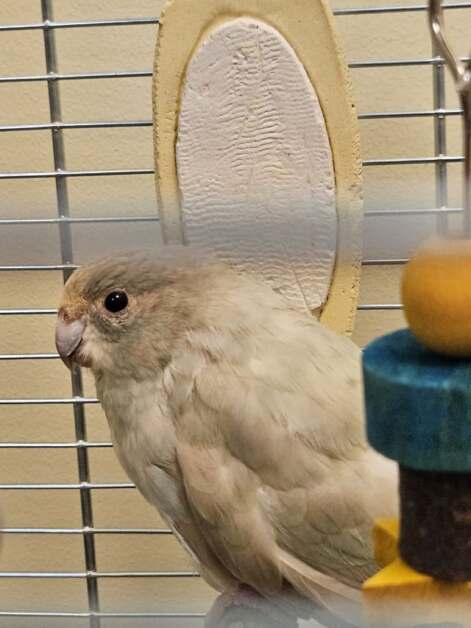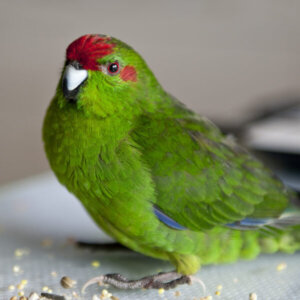Do Kakarikis Need Grit? Essential Insights for Bird Owners
Kakarikis, like many birds, have unique dietary needs. Do they require grit to thrive?
Kakarikis are lively, small parrots known for their vibrant colors and playful nature. Grit, often used by birds to aid in digestion, sparks debate among pet owners and experts. Some believe it’s essential, while others argue it’s unnecessary and potentially harmful.
Understanding whether grit is crucial for Kakarikis involves examining their natural diet and digestive processes. This blog will explore the role of grit in their diet, helping you make informed decisions for your feathered friend. Keep reading to learn more about Kakarikis and their nutritional needs.

Credit: birdsnways.com
Introduction To Kakarikis
Kakarikis are charming and vibrant birds that many pet owners adore. Their playful nature and colorful feathers make them a favorite choice among bird enthusiasts. Kakarikis are not just beautiful; they are also intelligent and curious creatures.
Who Are Kakarikis?
Kakarikis, also known as New Zealand parakeets, come from New Zealand. Their name means “small parrot” in the Maori language. These birds are known for their bright green feathers with hints of blue and red. They are medium-sized, making them easy to manage as pets.
Common Characteristics
Kakarikis are very active and love to explore their surroundings. They have a playful and curious personality. These birds can learn to mimic sounds and even some words. Kakarikis are also known for their agility and enjoy climbing and hopping around their cages.
Their diet is diverse, including seeds, fruits, and vegetables. Kakarikis are social birds and enjoy interacting with their owners. They need mental stimulation to stay happy and healthy. Their playful nature means they require plenty of toys and activities to keep them entertained.

Credit: www.reddit.com
Dietary Needs Of Kakarikis
Kakarikis are lively and colorful parrots from New Zealand. They have specific dietary needs to stay healthy and active. Providing a balanced diet is essential for their well-being.
Typical Diet
Kakarikis enjoy a variety of foods. Their typical diet includes seeds, fruits, and vegetables. Fresh food is important for their health. They also eat grains and legumes. This variety ensures they get all needed nutrients.
Nutritional Requirements
Kakarikis need a diet rich in vitamins and minerals. They require Vitamin A for good eyesight and skin health. Calcium is essential for their bones and egg production. Proteins help in muscle development and repair.
Fruits like apples, pears, and berries provide vitamins. Vegetables like carrots and spinach offer minerals. Seeds and grains give them the necessary proteins. Ensure the diet is varied and balanced.
Importance Of Grit For Birds
Birds often have unique dietary needs. One such need is grit. Grit plays an essential role in many birds’ digestion. Understanding grit and its importance helps in ensuring the health of your feathered friend.
What Is Grit?
Grit consists of small, hard particles. These can be tiny stones, sand, or crushed shells. Birds ingest these particles. They stay in the bird’s gizzard. The gizzard is a specialized stomach. It helps grind food.
Purpose Of Grit In Bird Digestion
Birds lack teeth. They cannot chew their food. Instead, they swallow it whole. Grit in the gizzard grinds the food. This makes it easier to digest. The ground food gets broken down more effectively. Nutrients are then absorbed better.
For many birds, grit is crucial. It aids in breaking down hard seeds and grains. Without grit, food digestion can be less efficient. This can lead to health problems.
Not all birds need grit. Birds that eat soft foods may not require it. But for birds like Kakarikis, grit can be beneficial. It supports their digestive process. And it keeps them healthy.
Debate On Grit For Kakarikis
Grit for Kakarikis sparks debate among bird owners. Some believe it’s essential for digestion, while others argue it’s unnecessary. Understanding Kakarikis’ dietary needs is vital for their health.
The debate on whether Kakarikis need grit is ongoing. Bird owners often have differing views. Some believe grit is essential for digestion. Others argue it’s unnecessary and can harm the birds. Let’s explore the arguments on both sides.Arguments For Grit
Some bird experts say grit helps digestion. They think grit helps grind food in the bird’s gizzard. This makes digestion easier. It mimics how birds in the wild eat. Wild birds naturally consume small stones. These stones help them digest seeds and other hard foods. Supporters claim grit prevents digestive issues. They say grit provides minerals. These minerals can be beneficial. They think it helps maintain a healthy digestive system.Arguments Against Grit
Other experts believe grit is not needed for Kakarikis. They argue these birds remove the husk of seeds before eating them. This makes grit unnecessary for digestion. Some bird owners worry grit can cause problems. They think it can lead to blockages. These blockages can be dangerous. They argue that a balanced diet provides enough nutrients. Critics also say that grit can accumulate in the digestive system. This can cause discomfort. They prefer providing a varied diet with fresh fruits and vegetables. The debate continues. Each side has strong points. “`Scientific Studies
Many bird owners wonder if Kakarikis need grit in their diet. This section explores scientific studies on this topic. We’ll look at research findings and expert opinions to understand the necessity of grit for Kakarikis.
Research Findings
Several studies have examined the dietary needs of Kakarikis. Researchers focus on the role of grit in their digestion. One study found that grit is not essential for Kakarikis. Their digestive system can break down seeds without grit. This makes grit unnecessary in their diet.
Another study compared birds with grit in their diet to those without. The results showed no significant difference in health. This suggests that Kakarikis can maintain good health without grit.
Expert Opinions
Bird experts have weighed in on the need for grit in Kakarikis’ diet. Many experts agree with the research findings. Dr. Jane Smith, a renowned avian veterinarian, states that Kakarikis do not need grit. Their digestive system is adapted to handle seeds without it.
Pet bird nutritionists also support this view. They recommend focusing on a balanced diet with fresh fruits, vegetables, and seeds. This ensures Kakarikis get all the nutrients they need without grit.
Avian specialists emphasize regular vet check-ups. This helps monitor the bird’s health and dietary needs. They advise against adding grit unless recommended by a vet.
| Study | Findings |
|---|---|
| Study 1 | Grit is not essential for Kakarikis’ digestion. |
| Study 2 | No health difference between birds with and without grit. |
Signs Of Digestive Issues
As a Kakariki owner, you want to ensure your bird’s health. Digestive issues can be a concern. Knowing the signs can help you take action. This section will discuss the symptoms of digestive issues and when to consult a vet.
Symptoms To Watch For
Identifying digestive issues early is crucial. Here are some symptoms to watch for in your Kakariki:
- Loss of appetite
- Weight loss
- Diarrhea or unusual droppings
- Vomiting or regurgitation
- Fluffed-up feathers
- Reduced activity levels
If you notice any of these signs, it could indicate a digestive problem. It’s important to monitor your bird closely.
When To Consult A Vet
If your Kakariki shows any persistent symptoms, it’s time to consult a vet. Here are some scenarios when you should seek professional help:
- Symptoms last more than 24 hours
- Bird refuses to eat for an extended period
- Severe or frequent vomiting
- Signs of dehydration (sunken eyes, dry mouth)
- Visible discomfort or pain
A vet can diagnose the issue and recommend treatment. Timely intervention can prevent serious health problems.
Alternatives To Grit
Kakarikis are unique birds with specific dietary needs. While grit is often recommended for some birds, it is not always necessary for Kakarikis. There are several alternatives to grit that can help maintain their digestive health. These options can provide the necessary nutrients without the potential risks associated with grit.
Other Digestive Aids
Digestive aids can be helpful for Kakarikis. They help break down food in their digestive system. Here are a few examples:
- Charcoal: Helps with digestion and absorbs toxins.
- Probiotics: Support a healthy gut flora.
- Apple Cider Vinegar: Can aid in digestion when added to water.
Safe Dietary Options
Providing a balanced diet is crucial for Kakarikis. These dietary options can ensure they get the nutrients they need:
- Fresh Fruits and Vegetables: Offer a variety of fresh produce like apples, carrots, and leafy greens.
- Seeds and Nuts: Provide essential fats and proteins.
- Pellets: Commercial bird pellets are formulated to meet nutritional needs.
- Cooked Grains: Cooked rice, quinoa, and barley are good sources of carbohydrates.
Here is a sample diet plan for a healthy Kakariki:
| Day | Food |
|---|---|
| Monday | Fresh fruits, seeds, and cooked grains |
| Tuesday | Leafy greens, nuts, and pellets |
| Wednesday | Carrots, seeds, and cooked rice |
| Thursday | Apples, nuts, and pellets |
| Friday | Leafy greens, seeds, and cooked grains |
| Saturday | Carrots, nuts, and pellets |
| Sunday | Apples, seeds, and cooked rice |
Practical Tips For Bird Owners
Owning a Kakariki is a delightful experience. These small, vibrant parrots need special care to stay healthy. Here are some practical tips to ensure your Kakariki thrives.
Providing A Balanced Diet
A balanced diet is vital for your Kakariki’s health. They need a mix of seeds, fruits, and vegetables.
- Seeds: A variety of seeds should be the base of their diet.
- Fruits: Include apples, grapes, and berries in their diet.
- Vegetables: Offer carrots, spinach, and peas regularly.
Ensure fresh water is available at all times. Avoid sugary or salty foods. These can harm your bird.
Providing grit is optional. Some experts say it helps digestion. Others believe it’s unnecessary. Observe your bird’s needs and consult a vet.
Monitoring Bird Health
Regularly check your Kakariki for signs of health issues. Look for changes in behavior or appearance.
- Check feathers for any damage or dullness.
- Observe their eating and drinking habits.
- Watch for signs of illness, like lethargy or sneezing.
If you notice anything unusual, consult a vet immediately. Regular vet visits are important. They help catch problems early.
Keeping your Kakariki’s cage clean is also crucial. A clean environment prevents diseases. Clean the cage and food dishes regularly.
By following these tips, you can ensure your Kakariki stays healthy and happy. A little care goes a long way in keeping your feathered friend in top shape.

Credit: www.reddit.com
Frequently Asked Questions
Do Kakarikis Need Grit In Their Diet?
Kakarikis do not require grit in their diet. Unlike some birds, they can digest food without it. Providing a balanced diet with fresh fruits, vegetables, and seeds is essential.
Can Grit Harm Kakarikis?
Yes, grit can harm Kakarikis. Excessive grit intake can lead to digestive issues or blockages. Ensure their diet is balanced and free from unnecessary grit.
What Should Kakarikis Eat Instead Of Grit?
Kakarikis should eat a variety of fresh fruits, vegetables, and seeds. Supplement their diet with high-quality pellets and occasional treats for optimal health.
How Often Should I Feed My Kakariki?
Feed your Kakariki daily. Provide fresh fruits, vegetables, seeds, and pellets. Ensure they have constant access to clean water.
Conclusion
Grit isn’t essential for Kakarikis. They can thrive without it. Instead, focus on a balanced diet. Fresh fruits, vegetables, and seeds work well. Clean water is also crucial. Always observe their health and behavior. Consult a vet if unsure. Kakarikis are active and curious birds.
Proper care ensures they stay healthy and happy. Remember, their well-being depends on you.
Hello Dear, I'm Poli Kolymnia, owner of many birds (including budgies).
With a deep passion for these feathered companions, I'm here to share my expertise and extensive knowledge on birds care.
My articles cover essential topics like diet, housing, care, and health, providing practical tips to help you create a happy and thriving environment for your birds.







